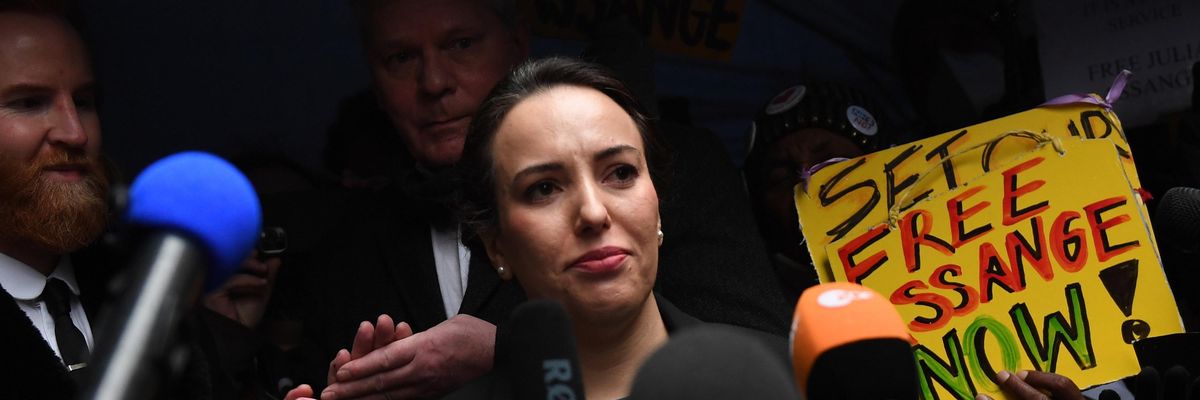Press freedom advocates are heralding what one called a "heartbreaking" statement by the fiancee of WikiLeaks founder Julian Assange after the U.K. Supreme Court on Monday rejected the imprisoned journalist's attempt to appeal his pending extradition to the United States, where he faces up to 175 in prison for espionage charges.
"Julian was just doing his job, which was to publish the truth about wrongdoing."
"Just this morning on our way to school, our four-year-old son asked me when daddy will come home," wrote Stella Moris in her Substack newsletter. "Julian's life is being treated as if it were expendable."
"He has been robbed of over a decade of liberty, and three years from his home and his young children who are being forced to grow up without their father," she added. "A system that allows this is a system that has lost its way."
Condemnation of the U.K. legal system has mounted since a December decision that Assange could be extradited to the United States, with critics warning that it would set a dangerous precedent for all journalists who challenge powerful governments and publish classified material.
"Whether Julian is extradited or not, which is the same as saying whether he lives or dies, is being decided through a process of legal avoidance," said Moris. "Julian is the key witness, the principle indicter, and the cause of enormous embarrassment to successive U.S. governments."
Moris, who plans to wed Assange behind bars next week, continued:
Julian was just doing his job, which was to publish the truth about wrongdoing. His loyalty is the same as that which all journalists should have: to the public. Not to the spy agencies of a foreign power. He published evidence that the country that is trying to extradite him committed war crimes and covered them up; that it committed gross violations that killed tens of thousands of innocent men, women, and children; that it tortured and rendered; that it bombed children, had death squads, and murdered Reuters journalists in cold blood; that it bribed foreign officials and bullied less powerful countries into harming their own citizens, and that it also corrupted allied nations' judicial inquiries into U.S. wrongdoing. For this, that country wants him in prison for 175 years.
Noting that "Julian's fate now lies in the hands of" U.K. Home Secretary Priti Patel--who could authorize Assange's extradition--Moris highlighted that "this is a political case and she can end it."
"It takes political courage but that is what it needed to preserve an open society that protects publishers from foreign persecution," Moris argued. "The cruelty against Julian is corrupting. It corrupts our most cherished values and institutions. They will be extinguished and lost forever unless this travesty is brought to an end."
In response to Moris' statement, U.K. activist Chloe Schlosberg tweeted that "Assange is being tortured slowly by the state for exposing crimes that needed to be seen."
"It is the deepest reflection of failure," she added, "for anyone who believes in truth and justice that he now sits in prison waiting for [Priti Patel] to make a brave decision."
Greek economist and Progressive International co-founder Yanis Varoufakis called the statement "heartbreaking" and emphasized warnings about the impact of allowing the U.S. case against Assange, an Australian, to proceed.
Outrage over the U.K. Supreme Court's decision continued to build Tuesday. In a statement, the International Press Institute (IPI) reiterated its call for the U.S. government to immediately drop its prosecution of Assange.
"IPI continues to strongly oppose Assange's prosecution under the Espionage Act on grounds that it poses a critical and unacceptable threat to the media's right to gather and publish information that is in the public interest," said the group, which is based in Vienna, Austria.
"The use of this 1917 law, which criminalizes the disclosure of classified information, sets a dangerous precedent for punishing journalists in relation to core newsgathering and reporting activities," IPI added. "It has the potential to cast a chilling effect over national security reporting in the U.S. and around the world."




